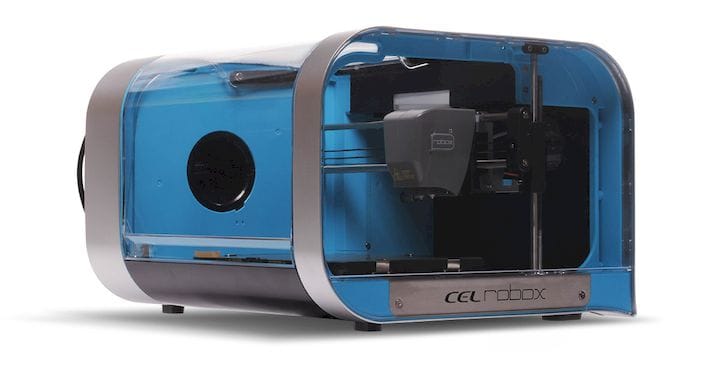![The RoboxDual desktop 3D printer [Source: CEL-Robox]](https://fabbaloo.com/wp-content/uploads/2020/05/image-asset_img_5eb09b16dada5.jpg)
As the March 29 date of Brexit approaches, it seems it will have some effect on 3D printer companies based in the UK.
I’m reading a post from CEL-Robox that tells their Brexit story.
CEL-Robox is a UK–based company that has been producing very high-quality — and often quite innovative — desktop 3D printers for many years. I’ve often been surprised by some of their quite interesting innovations, such as this unusual needle valve, which perfectly solves the retraction problem.
Now they are facing Brexit, as are all UK–based companies. What does this mean for the small 3D printer manufacturing company? They explain:
“When we heard the result from the Brexit vote we got a little worried and started to think how CEL-UK would survive in the UK when not in Europe. The devaluation of the pound instantly affected the company’s profitability as most of the products we purchased were from China who deal in USD, whilst all our development is done in the UK.”
And:
“We are a product development company, with a strong history of developing innovative products and getting them to market across the world. How would we play to this strength with the changing business topography? The market for domestic 3D printers continues to grow but not at the rate we were used to whilst the prosumer and industrial markets growth rate is increasing. We need a way to pay for R&D in these rapidly growing markets to help pay for the development of products, we couldn’t rely on our current portfolio of product to fund this needed change in direct.”
It seems in this case the root of the problem is the devaluation of the currency, which pressures the finances of the manufacturer and apparently is generating some new innovations.
Some of CEL-Robox’s changes relate to pricing. For example, they will now be charging a license fee for their most advanced software tools, where previously this was offered at no charge.
CEL-Robox has also published a rudimentary roadmap that seems to transform their current 3D printer offering into one more suitable for professional applications. They intend on adding features such as:
-
Larger build volume
-
Network connectivity
-
On machine UI
-
HEPA filtration
-
Native support of 2 materials
-
Externally fed stock material
-
Flexible magnetic print surface
If you look closely at this list of additions, you’ll notice that many of these features are frequently found on today’s professional 3D printers from other vendors. Features such as a flexible magnetic print service are now pretty much the de facto standard for reasonable machines.
While the Brexit scenario is undoubtedly affecting CEL-Robox’s finances, it would seem that the company is correspondingly being forced into the leap from consumer to professional products, as have many other 3D printing companies have experienced.
Ultimaker, for example, began many years ago as a hobby machine, where are you would order a box full of parts and assemble it into it working 3D printer. But today we find their product line to be entirely different. Their current product line includes highly networked, cloud-driven, multi-material machines intended for use in professional offices. They are also very successful.
3D printer manufacturers made this transformation for one reason: they followed the money. The fact that consumers failed to pick up massive quantities of 3D printers spoiled the business plan for many young 3D printer manufacturing startups. It was then quickly discovered by most manufacturers that professionals, which might include industrial designers, engineers, prototypers and others in business actually could make profitable use of 3D printing equipment — if it had certain features.
Many of those features will be added to CEL-Robox’s product line.
So what is Brexit really doing here? I think the financial aspects are forcing CEL-Robox into a business transformation that others have already gone through. Many other companies have found this move to be very successful, and there is no reason we shouldn’t expect the same from CEL-Robox.
Via CEL-Robox











A blog post reveals much of what happens behind the scenes at 3D print service Shapeways.